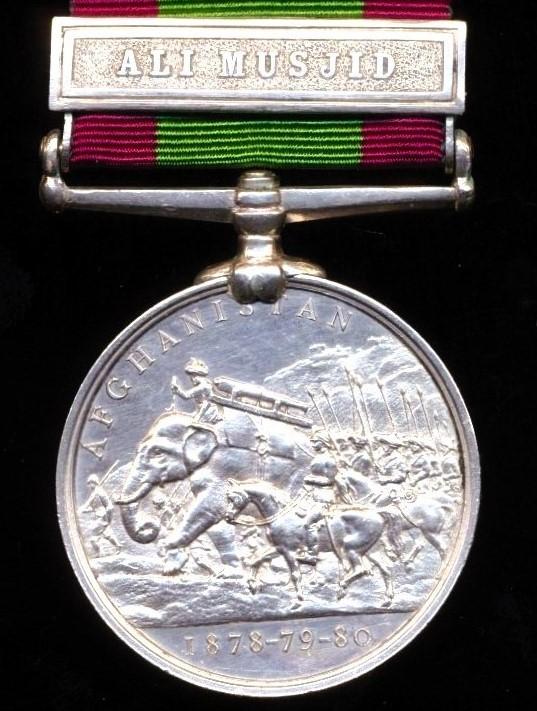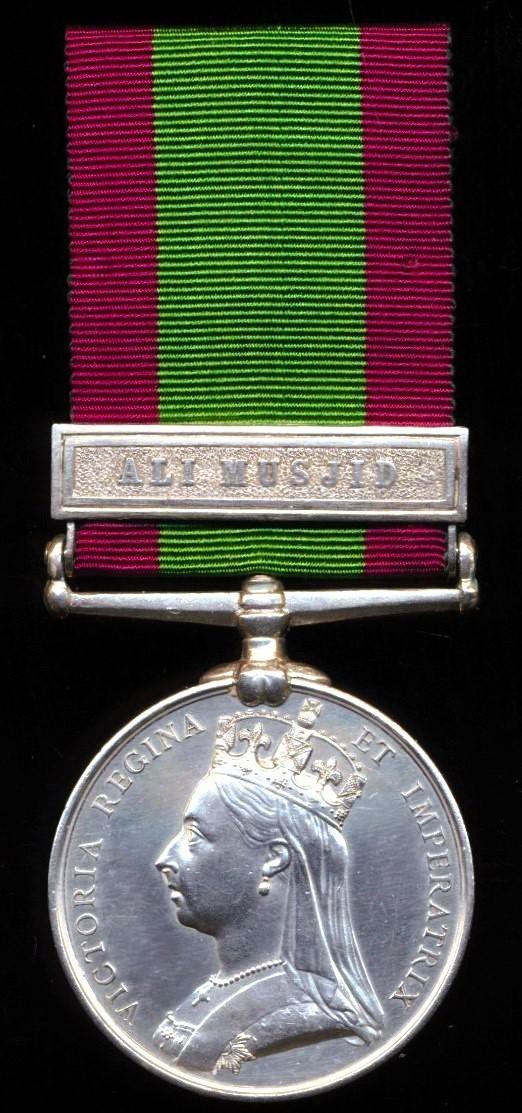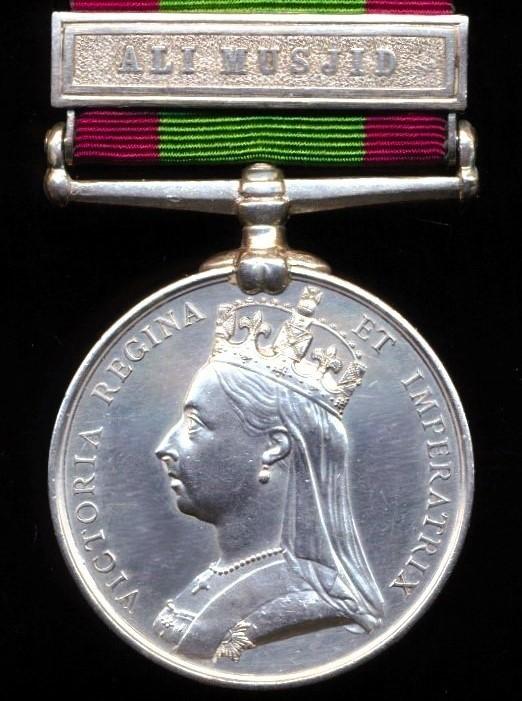Afghanistan Medal 1878-80. With clasp 'Ali Musjid' (2110. Pte. W. Donovan. 4th. Bn. Rifle Bde.)
Second Afghan War Fatal Casualty: Private Donovan is confirmed on the respective campaign medal as 'Dead' prior to the medal roll being compiled and signed, and prior to the regiments return to British India
Cholera: Quite apart from 'Battlefield casualties' 4th Battalion Rifle Brigade lost an estimated 100 'All-Ranks' who died of disease, ill-health and accident, during while on active service 1878-79 - all marked as 'Dead' (without date) on the respective campaign medal roll - and a sobering reflection on the appalling casualty losses that practically all battalions of the British and Indian Army's that served in Afghanistan, but which casualties of war were rarely ever recorded or published in the public domain at the time - or since! It is highly likely that Private Donovan was one of the 79 x men of the regiment known to have died in major Cholera outbreak that claimed no less then 70 x all-ranks from the dreaded disease over a period of three weeks in the period June-July 1879
Medal & clasp verification: Private William Donovan, 4th Battalion Rifle Brigade is confirmed entitled to the medal and clasp per the respective campaign medal roll cited below:
- Second Afghan Medal & clasp 'Ali Musjid': WO 100/53 (with entry 'Dead', under remarks column
Private William Donovan, was one of two men of the same name, who served with 4th Battalion Rifle Brigade in the period 1871-1879 (the other soldier survived the Afghan War, and took his discharge in the United Kingdom). No. 2110 is recorded as having been serving with the 4th Battalion Rifle Brigade, at e
arly as from 1871 in which year records record him serving with his battalion at, Shorncliffe, England
Reference 'The Afghan Campaign 1878-1880' (S. H. Shadbolt, ), the regiment's record of service during the Second Afghan War was:
Quote,
4th BATTN. RIFLE BRIGADE.
In November, 1878, the 4th Battn. Rifle Brigade, commanded by Colonel H. R. L. Newdigate, was quartered at Peshawar. About the 15th of that month orders were received for it to form part of the 1st (Brigadier-General Macpherson’s) Brigade of the 1st Division Peshawar Valley Field Force, then assembling at that station under the command of Lt.-Genl. Sir Sam. Browne, K.C.S.I., C.B., V.C.
Taking part in the operations resulting in the capture of Ali Musjid, the battalion was employed, on the 21st and 22nd November, 1878, in the flanking movements of the 1st Brigade over the precipitous hotas Heights in reverse of the Fort, and after the retreat of the Afghan forces participated in the forward movement of the Division to Daka, and subsequently to Jalalabad.
In January, 1879, the Head-quarters and major part of the battalion proceeded from Jalalabad to Basawal to join the force under the command of Brigadier-General Tytler, which was about to march from that post into the Bazar Valley in the second expedition against the Zaka Khel Afridis. After taking part in the various operations which ensued, including the reconnaissance and skirmish of the 28th January near Halwai, they returned with the other units of the column, and rejoined Divisional Head quarters on the 7th February. On that day all the available men of the battalion left at Jalalabad under the command of Captain St. Paul, took part in an expedition across the Kabul River into the Kunar
Valley against a force of Mohmands, who dispersed after a few shots had been fired.
A portion of the 2nd Battalion Rifle Brigade formed part of the expeditionary force under the command of Brigadier-General Jenkins which crossed the Lughman River on the 22nd February, 1879, and after penetrating a distance of thirty miles into new country, returned to Jalalabad on the 2 th idem. Again, on the 31st March, 300 men of the battalion accompanied the force under the command of Brigadier-General Macpherson in the second Lughman Valley expedition, crossing the Siah Koh range, in a forced march of twenty-six hours’ duration, covering in that time some thirty-five miles of most difficult country, and eventually returning to Jalalabad on the 4th April.
The battalion advanced with the remainder of the Brigade to Safed Sang, where it remained till after the signing of the treaty of Gandamak. Quitting that post for Murree on the 3rd June, 1879, it crossed the frontier on the 13th, and arrived at the foot of the hills near Abbottabad on the 30th idem. During the return-march cholera broke out in the ranks, and together with heat apoplexy, claimed no less than seventy-six lives in the space of three weeks.
Unquote.
Sold together with hard-copy extract page from the respective campaign medal roll
Condition: About EF
Code: 24299
375.00 GBP







